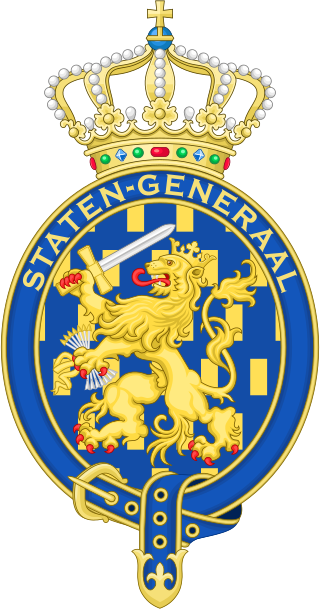
Jus soli, meaning 'right of soil', is the right of anyone born in the territory of a state to nationality or citizenship, also commonly referred to as birthright citizenship in some Anglophone countries, is a rule defining a person's nationality based on their birth in the territory of the country. Jus soli was part of the English common law, in contrast to jus sanguinis, which derives from the Roman law that influenced the civil-law systems of mainland Europe.
Nationality law is the law of a sovereign state, and of each of its jurisdictions, that defines the legal manner in which a national identity is acquired and how it may be lost. In international law, the legal means to acquire nationality and formal membership in a nation are separated from the relationship between a national and the nation, known as citizenship. Some nations domestically use the terms interchangeably, though by the 20th century, nationality had commonly come to mean the status of belonging to a particular nation with no regard to the type of governance which established a relationship between the nation and its people. In law, nationality describes the relationship of a national to the state under international law and citizenship describes the relationship of a citizen within the state under domestic statutes. Different regulatory agencies monitor legal compliance for nationality and citizenship. A person in a country of which he or she is not a national is generally regarded by that country as a foreigner or alien. A person who has no recognised nationality to any jurisdiction is regarded as stateless.

Italian nationality law is the law of Italy governing the acquisition, transmission and loss of Italian citizenship. Like many continental European countries it is largely based on jus sanguinis. It also incorporates many elements that are seen as favourable to the Italian diaspora. The Italian Parliament's 1992 update of Italian nationality law is Law no. 91, and came into force on 15 August 1992. Presidential decrees and ministerial directives, including several issued by the Ministry of the Interior, instruct the civil service how to apply Italy's citizenship-related laws.

Belgian nationality law provides for the conditions in which a person holds Belgian nationality and is based on a mixture of the principles of jus sanguinis and jus soli.

Dutch nationality law details the conditions by which a person holds Dutch nationality. The primary law governing these requirements is the Dutch Nationality Act, which came into force on 1 January 1985. Regulations apply to the entire Kingdom of the Netherlands, which includes the country of the Netherlands itself, Aruba, Curaçao, and Sint Maarten.

Swedish nationality law determines entitlement to Swedish citizenship. Citizenship of Sweden is based primarily on the principle of jus sanguinis. In other words, citizenship is conferred primarily by birth to a Swedish parent, irrespective of place of birth.

Polish nationality law is based primarily on the principle of jus sanguinis. Children born to at least one Polish parent acquire Polish citizenship irrespective of place of birth. Besides other things, Polish citizenship entitles the person to a Polish passport.

Slovenian nationality law is based primarily on the principles of jus sanguinis, in that descent from a Slovenian parent is the primary basis for acquisition of Slovenian citizenship. However, although children born to foreign parents in Slovenia do not acquire Slovenian citizenship on the basis of birthplace, place of birth is relevant for determining whether the child of Slovenian parents acquires citizenship.

The Nationality law in Nepal are regulated primarily by 2015 Constitution of Nepal, Nepal Citizenship Act 2006 and Nepal Citizenship Regulations 2006. The Nepali Constitution regulates provisions for Nepali nationality in Part 2 from Article 10 to 15. The Nepal Citizenship Act 1964 was first promulgated on 28 February 1964 and provides for single citizenship for the entire country to inherit Nepali nationality. The Nepal Citizenship Act, 2006 was enacted on 26 November 2006. It repeals the 1964 Act and makes further provisions for the acquisition and termination of Nepali citizenship and related. Recently, after the 3rd amendment of the Citizenship Procedures, Non-Resident Nepali are also allowed to have citizenship with limited social, economic and cultural rights.

Japanese Nationality Law details the conditions by which a person holds nationality of Japan. The primary law governing nationality regulations is the 1950 Nationality Act.

Nationality law of Greece is based on the principle of jus sanguinis. Greek citizenship may be acquired by descent or through naturalization. Greek law permits dual citizenship. A Greek national is a citizen of the European Union, and therefore entitled to the same rights as other EU citizens.

Turkish nationality law is based primarily on the principle of jus sanguinis. Children who are born to a Turkish mother or a Turkish father are Turkish citizens from birth. The intention to renounce Turkish citizenship is submitted in Turkey by a petition to the highest administrative official in the concerned person's place of residence, and when overseas to the Turkish consulate. Documents processed by these authorities are forwarded to the Ministry of Interior (Turkey) for appropriate action.

Danish nationality law is governed by the Constitutional Act and the Consolidated Act of Danish Nationality. Danish nationality can be acquired in one of the following ways:

The Romanian nationality law addresses specific rights, duties, privileges, and benefits between Romania and the individual. Romanian nationality law is based on jus sanguinis. Current citizenship policy in Romania is in accordance with the Romanian Citizenship Law, which was adopted by the Romanian Parliament on March 6, 1991, and the Constitution of Romania, which was adopted on November 21, 1991.

Luxembourg nationality law is ruled by the Constitution of Luxembourg. The Grand Duchy of Luxembourg is a member state of the European Union and, therefore, its citizens are also EU citizens.

Multiple citizenship is a person's legal status in which a person is at the same time recognized by more than one country under its nationality and citizenship law as a national or citizen of that country. There is no international convention that determines the nationality or citizenship status of a person, which is consequently determined exclusively under national laws, that often conflict with each other, thus allowing for multiple citizenship situations to arise.

Thai nationality law includes principles of both jus sanguinis and jus soli. Thailand's first Nationality Act was passed in 1913. The most recent law dates to 2008.

Albanian nationality law is based on a mixture of the principles of Jus sanguinis and Jus soli. In other words, both place of birth and Albanian parentage are relevant for determining whether a person is an Albanian citizen. It is regulated by the "Law on Albanian Citizenship". In some circumstances citizenship is granted to children born in Albania to non-Albanian parents. This is not the case where parents are temporary or short-term visitors. As suggested by the United Nations and Council of Europe, all efforts are made in order to avoid statelessness.

Venezuelan nationality law is the law governing the acquisition, transmission and loss of Venezuelan citizenship. It is based on the principle of jus soli: any person born in Venezuela acquires Venezuelan citizenship at birth, irrespective of nationality or status of parents. Venezuelan nationality law is regulated by Section 1 of Chapter 2 of the Constitution of Venezuela and by the Nationality and Citizenship Act of 2004.
The nationality law of Bosnia and Herzegovina governs the acquisition, transmission and loss of citizenship of Bosnia and Herzegovina. Regulated under the framework of the Law on Citizenship of Bosnia and Herzegovina, it is based primarily on the principle of jus sanguinis.



















